
The Project Gutenberg EBook of The Adventures of Tom Sawyer, Part 2. by Mark Twain (Samuel Clemens) This eBook is for the use of anyone anywhere at no cost and with almost no restrictions whatsoever. You may copy it, give it away or re-use it under the terms of the Project Gutenberg License included with this eBook or online at www.gutenberg.net Title: The Adventures of Tom Sawyer, Part 2. Author: Mark Twain (Samuel Clemens) Release Date: June 29, 2004 [EBook #7194] Language: English Character set encoding: ISO-8859-1 *** START OF THIS PROJECT GUTENBERG EBOOK TOM SAWYER, PART 2. *** Produced by David Widger





|
CHAPTER IV. CHAPTER V. CHAPTER VI. CHAPTER VII. |
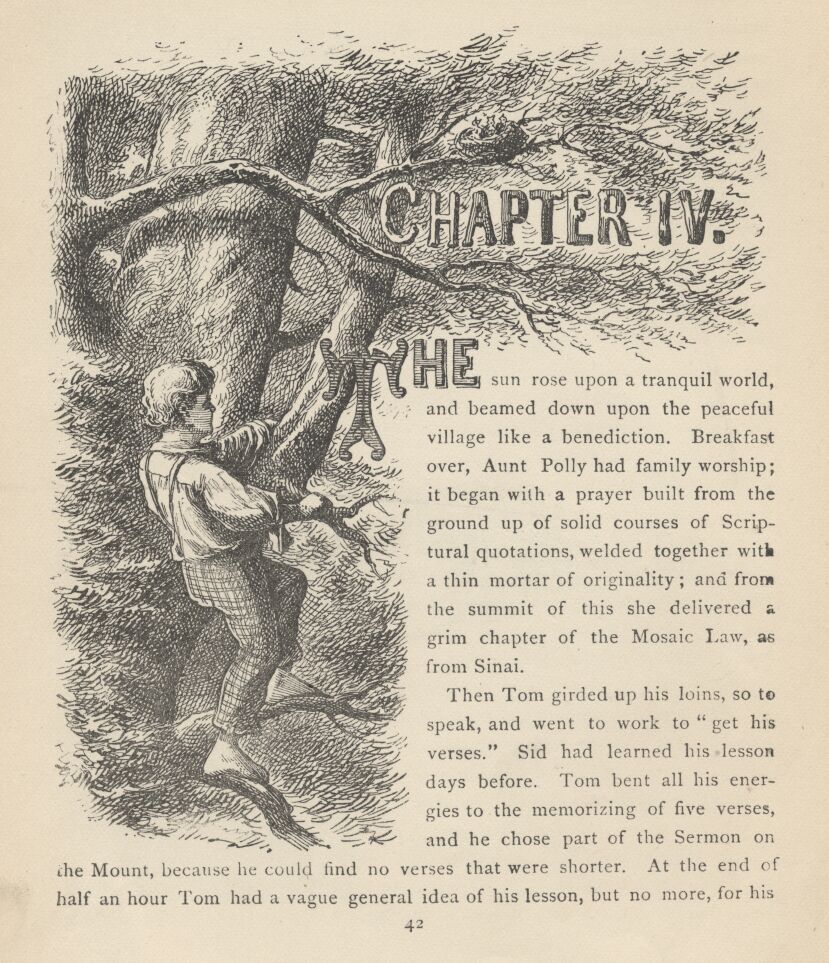
THE sun rose upon a tranquil world, and beamed down upon the peaceful village like a benediction. Breakfast over, Aunt Polly had family worship: it began with a prayer built from the ground up of solid courses of Scriptural quotations, welded together with a thin mortar of originality; and from the summit of this she delivered a grim chapter of the Mosaic Law, as from Sinai.
Then Tom girded up his loins, so to speak, and went to work to "get his verses." Sid had learned his lesson days before. Tom bent all his energies to the memorizing of five verses, and he chose part of the Sermon on the Mount, because he could find no verses that were shorter. At the end of half an hour Tom had a vague general idea of his lesson, but no more, for his mind was traversing the whole field of human thought, and his hands were busy with distracting recreations. Mary took his book to hear him recite, and he tried to find his way through the fog:
"Blessed are the—a—a—"
"Poor"—
"Yes—poor; blessed are the poor—a—a—"
"In spirit—"
"In spirit; blessed are the poor in spirit, for they—they—"
"THEIRS—"
"For THEIRS. Blessed are the poor in spirit, for theirs is the kingdom of heaven. Blessed are they that mourn, for they—they—"
"Sh—"
"For they—a—"
"S, H, A—"
"For they S, H—Oh, I don't know what it is!"
"SHALL!"
"Oh, SHALL! for they shall—for they shall—a—a—shall mourn—a—a—blessed are they that shall—they that—a—they that shall mourn, for they shall—a—shall WHAT? Why don't you tell me, Mary?—what do you want to be so mean for?"
"Oh, Tom, you poor thick-headed thing, I'm not teasing you. I wouldn't do that. You must go and learn it again. Don't you be discouraged, Tom, you'll manage it—and if you do, I'll give you something ever so nice. There, now, that's a good boy."
"All right! What is it, Mary, tell me what it is."
"Never you mind, Tom. You know if I say it's nice, it is nice."
"You bet you that's so, Mary. All right, I'll tackle it again."
And he did "tackle it again"—and under the double pressure of curiosity and prospective gain he did it with such spirit that he accomplished a shining success. Mary gave him a brand-new "Barlow" knife worth twelve and a half cents; and the convulsion of delight that swept his system shook him to his foundations. True, the knife would not cut anything, but it was a "sure-enough" Barlow, and there was inconceivable grandeur in that—though where the Western boys ever got the idea that such a weapon could possibly be counterfeited to its injury is an imposing mystery and will always remain so, perhaps. Tom contrived to scarify the cupboard with it, and was arranging to begin on the bureau, when he was called off to dress for Sunday-school.
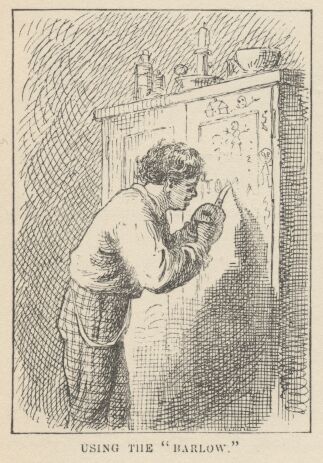
Mary gave him a tin basin of water and a piece of soap, and he went outside the door and set the basin on a little bench there; then he dipped the soap in the water and laid it down; turned up his sleeves; poured out the water on the ground, gently, and then entered the kitchen and began to wipe his face diligently on the towel behind the door. But Mary removed the towel and said:
"Now ain't you ashamed, Tom. You mustn't be so bad. Water won't hurt you."
Tom was a trifle disconcerted. The basin was refilled, and this time he stood over it a little while, gathering resolution; took in a big breath and began. When he entered the kitchen presently, with both eyes shut and groping for the towel with his hands, an honorable testimony of suds and water was dripping from his face. But when he emerged from the towel, he was not yet satisfactory, for the clean territory stopped short at his chin and his jaws, like a mask; below and beyond this line there was a dark expanse of unirrigated soil that spread downward in front and backward around his neck. Mary took him in hand, and when she was done with him he was a man and a brother, without distinction of color, and his saturated hair was neatly brushed, and its short curls wrought into a dainty and symmetrical general effect. [He privately smoothed out the curls, with labor and difficulty, and plastered his hair close down to his head; for he held curls to be effeminate, and his own filled his life with bitterness.] Then Mary got out a suit of his clothing that had been used only on Sundays during two years—they were simply called his "other clothes"—and so by that we know the size of his wardrobe. The girl "put him to rights" after he had dressed himself; she buttoned his neat roundabout up to his chin, turned his vast shirt collar down over his shoulders, brushed him off and crowned him with his speckled straw hat. He now looked exceedingly improved and uncomfortable. He was fully as uncomfortable as he looked; for there was a restraint about whole clothes and cleanliness that galled him. He hoped that Mary would forget his shoes, but the hope was blighted; she coated them thoroughly with tallow, as was the custom, and brought them out. He lost his temper and said he was always being made to do everything he didn't want to do. But Mary said, persuasively:
"Please, Tom—that's a good boy."
So he got into the shoes snarling. Mary was soon ready, and the three children set out for Sunday-school—a place that Tom hated with his whole heart; but Sid and Mary were fond of it.

Sabbath-school hours were from nine to half-past ten; and then church service. Two of the children always remained for the sermon voluntarily, and the other always remained too—for stronger reasons. The church's high-backed, uncushioned pews would seat about three hundred persons; the edifice was but a small, plain affair, with a sort of pine board tree-box on top of it for a steeple. At the door Tom dropped back a step and accosted a Sunday-dressed comrade:
"Say, Billy, got a yaller ticket?"
"Yes."
"What'll you take for her?"
"What'll you give?"
"Piece of lickrish and a fish-hook."
"Less see 'em."
Tom exhibited. They were satisfactory, and the property changed hands. Then Tom traded a couple of white alleys for three red tickets, and some small trifle or other for a couple of blue ones. He waylaid other boys as they came, and went on buying tickets of various colors ten or fifteen minutes longer. He entered the church, now, with a swarm of clean and noisy boys and girls, proceeded to his seat and started a quarrel with the first boy that came handy. The teacher, a grave, elderly man, interfered; then turned his back a moment and Tom pulled a boy's hair in the next bench, and was absorbed in his book when the boy turned around; stuck a pin in another boy, presently, in order to hear him say "Ouch!" and got a new reprimand from his teacher. Tom's whole class were of a pattern—restless, noisy, and troublesome. When they came to recite their lessons, not one of them knew his verses perfectly, but had to be prompted all along. However, they worried through, and each got his reward—in small blue tickets, each with a passage of Scripture on it; each blue ticket was pay for two verses of the recitation. Ten blue tickets equalled a red one, and could be exchanged for it; ten red tickets equalled a yellow one; for ten yellow tickets the superintendent gave a very plainly bound Bible (worth forty cents in those easy times) to the pupil. How many of my readers would have the industry and application to memorize two thousand verses, even for a Dore Bible? And yet Mary had acquired two Bibles in this way—it was the patient work of two years—and a boy of German parentage had won four or five. He once recited three thousand verses without stopping; but the strain upon his mental faculties was too great, and he was little better than an idiot from that day forth—a grievous misfortune for the school, for on great occasions, before company, the superintendent (as Tom expressed it) had always made this boy come out and "spread himself." Only the older pupils managed to keep their tickets and stick to their tedious work long enough to get a Bible, and so the delivery of one of these prizes was a rare and noteworthy circumstance; the successful pupil was so great and conspicuous for that day that on the spot every scholar's heart was fired with a fresh ambition that often lasted a couple of weeks. It is possible that Tom's mental stomach had never really hungered for one of those prizes, but unquestionably his entire being had for many a day longed for the glory and the eclat that came with it.

In due course the superintendent stood up in front of the pulpit, with a closed hymn-book in his hand and his forefinger inserted between its leaves, and commanded attention. When a Sunday-school superintendent makes his customary little speech, a hymn-book in the hand is as necessary as is the inevitable sheet of music in the hand of a singer who stands forward on the platform and sings a solo at a concert—though why, is a mystery: for neither the hymn-book nor the sheet of music is ever referred to by the sufferer. This superintendent was a slim creature of thirty-five, with a sandy goatee and short sandy hair; he wore a stiff standing-collar whose upper edge almost reached his ears and whose sharp points curved forward abreast the corners of his mouth—a fence that compelled a straight lookout ahead, and a turning of the whole body when a side view was required; his chin was propped on a spreading cravat which was as broad and as long as a bank-note, and had fringed ends; his boot toes were turned sharply up, in the fashion of the day, like sleigh-runners—an effect patiently and laboriously produced by the young men by sitting with their toes pressed against a wall for hours together. Mr. Walters was very earnest of mien, and very sincere and honest at heart; and he held sacred things and places in such reverence, and so separated them from worldly matters, that unconsciously to himself his Sunday-school voice had acquired a peculiar intonation which was wholly absent on week-days. He began after this fashion:
"Now, children, I want you all to sit up just as straight and pretty as you can and give me all your attention for a minute or two. There—that is it. That is the way good little boys and girls should do. I see one little girl who is looking out of the window—I am afraid she thinks I am out there somewhere—perhaps up in one of the trees making a speech to the little birds. [Applausive titter.] I want to tell you how good it makes me feel to see so many bright, clean little faces assembled in a place like this, learning to do right and be good." And so forth and so on. It is not necessary to set down the rest of the oration. It was of a pattern which does not vary, and so it is familiar to us all.
The latter third of the speech was marred by the resumption of fights and other recreations among certain of the bad boys, and by fidgetings and whisperings that extended far and wide, washing even to the bases of isolated and incorruptible rocks like Sid and Mary. But now every sound ceased suddenly, with the subsidence of Mr. Walters' voice, and the conclusion of the speech was received with a burst of silent gratitude.
A good part of the whispering had been occasioned by an event which was more or less rare—the entrance of visitors: lawyer Thatcher, accompanied by a very feeble and aged man; a fine, portly, middle-aged gentleman with iron-gray hair; and a dignified lady who was doubtless the latter's wife. The lady was leading a child. Tom had been restless and full of chafings and repinings; conscience-smitten, too—he could not meet Amy Lawrence's eye, he could not brook her loving gaze. But when he saw this small newcomer his soul was all ablaze with bliss in a moment. The next moment he was "showing off" with all his might—cuffing boys, pulling hair, making faces—in a word, using every art that seemed likely to fascinate a girl and win her applause. His exaltation had but one alloy—the memory of his humiliation in this angel's garden—and that record in sand was fast washing out, under the waves of happiness that were sweeping over it now.
The visitors were given the highest seat of honor, and as soon as Mr. Walters' speech was finished, he introduced them to the school. The middle-aged man turned out to be a prodigious personage—no less a one than the county judge—altogether the most august creation these children had ever looked upon—and they wondered what kind of material he was made of—and they half wanted to hear him roar, and were half afraid he might, too. He was from Constantinople, twelve miles away—so he had travelled, and seen the world—these very eyes had looked upon the county court-house—which was said to have a tin roof. The awe which these reflections inspired was attested by the impressive silence and the ranks of staring eyes. This was the great Judge Thatcher, brother of their own lawyer. Jeff Thatcher immediately went forward, to be familiar with the great man and be envied by the school. It would have been music to his soul to hear the whisperings:
"Look at him, Jim! He's a going up there. Say—look! he's a going to shake hands with him—he IS shaking hands with him! By jings, don't you wish you was Jeff?"
Mr. Walters fell to "showing off," with all sorts of official bustlings and activities, giving orders, delivering judgments, discharging directions here, there, everywhere that he could find a target. The librarian "showed off"—running hither and thither with his arms full of books and making a deal of the splutter and fuss that insect authority delights in. The young lady teachers "showed off"—bending sweetly over pupils that were lately being boxed, lifting pretty warning fingers at bad little boys and patting good ones lovingly. The young gentlemen teachers "showed off" with small scoldings and other little displays of authority and fine attention to discipline—and most of the teachers, of both sexes, found business up at the library, by the pulpit; and it was business that frequently had to be done over again two or three times (with much seeming vexation). The little girls "showed off" in various ways, and the little boys "showed off" with such diligence that the air was thick with paper wads and the murmur of scufflings. And above it all the great man sat and beamed a majestic judicial smile upon all the house, and warmed himself in the sun of his own grandeur—for he was "showing off," too.
There was only one thing wanting to make Mr. Walters' ecstasy complete, and that was a chance to deliver a Bible-prize and exhibit a prodigy. Several pupils had a few yellow tickets, but none had enough—he had been around among the star pupils inquiring. He would have given worlds, now, to have that German lad back again with a sound mind.
And now at this moment, when hope was dead, Tom Sawyer came forward with nine yellow tickets, nine red tickets, and ten blue ones, and demanded a Bible. This was a thunderbolt out of a clear sky. Walters was not expecting an application from this source for the next ten years. But there was no getting around it—here were the certified checks, and they were good for their face. Tom was therefore elevated to a place with the Judge and the other elect, and the great news was announced from headquarters. It was the most stunning surprise of the decade, and so profound was the sensation that it lifted the new hero up to the judicial one's altitude, and the school had two marvels to gaze upon in place of one. The boys were all eaten up with envy—but those that suffered the bitterest pangs were those who perceived too late that they themselves had contributed to this hated splendor by trading tickets to Tom for the wealth he had amassed in selling whitewashing privileges. These despised themselves, as being the dupes of a wily fraud, a guileful snake in the grass.
The prize was delivered to Tom with as much effusion as the superintendent could pump up under the circumstances; but it lacked somewhat of the true gush, for the poor fellow's instinct taught him that there was a mystery here that could not well bear the light, perhaps; it was simply preposterous that this boy had warehoused two thousand sheaves of Scriptural wisdom on his premises—a dozen would strain his capacity, without a doubt.
Amy Lawrence was proud and glad, and she tried to make Tom see it in her face—but he wouldn't look. She wondered; then she was just a grain troubled; next a dim suspicion came and went—came again; she watched; a furtive glance told her worlds—and then her heart broke, and she was jealous, and angry, and the tears came and she hated everybody. Tom most of all (she thought).
Tom was introduced to the Judge; but his tongue was tied, his breath would hardly come, his heart quaked—partly because of the awful greatness of the man, but mainly because he was her parent. He would have liked to fall down and worship him, if it were in the dark. The Judge put his hand on Tom's head and called him a fine little man, and asked him what his name was. The boy stammered, gasped, and got it out:
"Tom."
"Oh, no, not Tom—it is—"
"Thomas."
"Ah, that's it. I thought there was more to it, maybe. That's very well. But you've another one I daresay, and you'll tell it to me, won't you?"
"Tell the gentleman your other name, Thomas," said Walters, "and say sir. You mustn't forget your manners."
"Thomas Sawyer—sir."
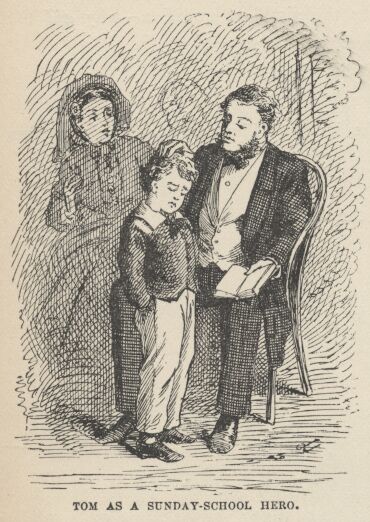
"That's it! That's a good boy. Fine boy. Fine, manly little fellow. Two thousand verses is a great many—very, very great many. And you never can be sorry for the trouble you took to learn them; for knowledge is worth more than anything there is in the world; it's what makes great men and good men; you'll be a great man and a good man yourself, some day, Thomas, and then you'll look back and say, It's all owing to the precious Sunday-school privileges of my boyhood—it's all owing to my dear teachers that taught me to learn—it's all owing to the good superintendent, who encouraged me, and watched over me, and gave me a beautiful Bible—a splendid elegant Bible—to keep and have it all for my own, always—it's all owing to right bringing up! That is what you will say, Thomas—and you wouldn't take any money for those two thousand verses—no indeed you wouldn't. And now you wouldn't mind telling me and this lady some of the things you've learned—no, I know you wouldn't—for we are proud of little boys that learn. Now, no doubt you know the names of all the twelve disciples. Won't you tell us the names of the first two that were appointed?"
Tom was tugging at a button-hole and looking sheepish. He blushed, now, and his eyes fell. Mr. Walters' heart sank within him. He said to himself, it is not possible that the boy can answer the simplest question—why DID the Judge ask him? Yet he felt obliged to speak up and say:
"Answer the gentleman, Thomas—don't be afraid."
Tom still hung fire.
"Now I know you'll tell me," said the lady. "The names of the first two disciples were—"
"DAVID AND GOLIAH!"
Let us draw the curtain of charity over the rest of the scene.
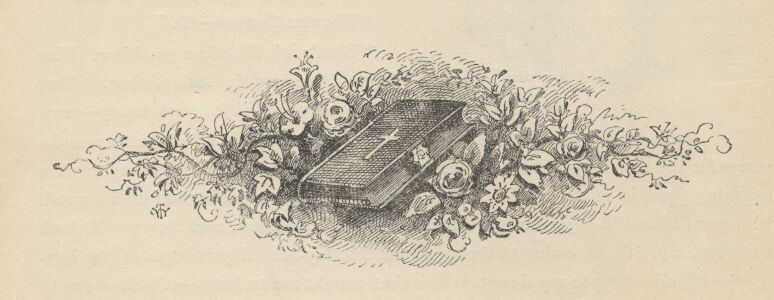
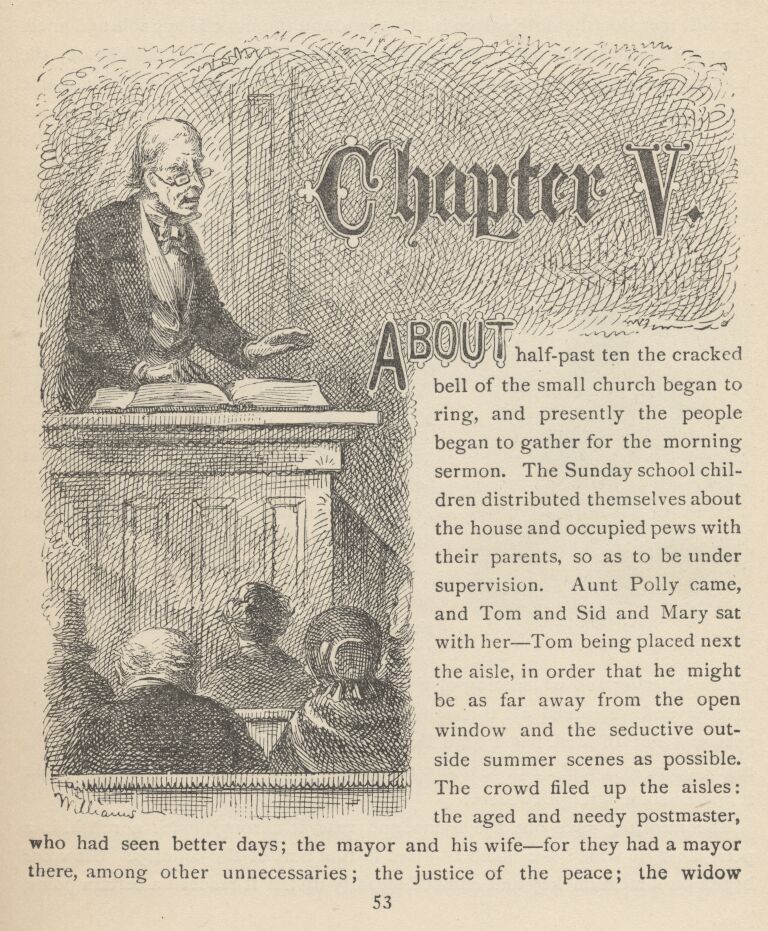
ABOUT half-past ten the cracked bell of the small church began to ring, and presently the people began to gather for the morning sermon. The Sunday-school children distributed themselves about the house and occupied pews with their parents, so as to be under supervision. Aunt Polly came, and Tom and Sid and Mary sat with her—Tom being placed next the aisle, in order that he might be as far away from the open window and the seductive outside summer scenes as possible. The crowd filed up the aisles: the aged and needy postmaster, who had seen better days; the mayor and his wife—for they had a mayor there, among other unnecessaries; the justice of the peace; the widow Douglass, fair, smart, and forty, a generous, good-hearted soul and well-to-do, her hill mansion the only palace in the town, and the most hospitable and much the most lavish in the matter of festivities that St. Petersburg could boast; the bent and venerable Major and Mrs. Ward; lawyer Riverson, the new notable from a distance; next the belle of the village, followed by a troop of lawn-clad and ribbon-decked young heart-breakers; then all the young clerks in town in a body—for they had stood in the vestibule sucking their cane-heads, a circling wall of oiled and simpering admirers, till the last girl had run their gantlet; and last of all came the Model Boy, Willie Mufferson, taking as heedful care of his mother as if she were cut glass. He always brought his mother to church, and was the pride of all the matrons. The boys all hated him, he was so good. And besides, he had been "thrown up to them" so much. His white handkerchief was hanging out of his pocket behind, as usual on Sundays—accidentally. Tom had no handkerchief, and he looked upon boys who had as snobs.
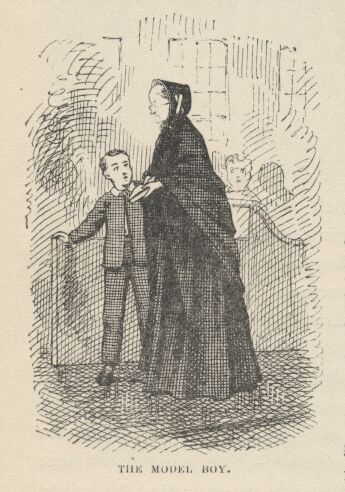
The congregation being fully assembled, now, the bell rang once more, to warn laggards and stragglers, and then a solemn hush fell upon the church which was only broken by the tittering and whispering of the choir in the gallery. The choir always tittered and whispered all through service. There was once a church choir that was not ill-bred, but I have forgotten where it was, now. It was a great many years ago, and I can scarcely remember anything about it, but I think it was in some foreign country.
The minister gave out the hymn, and read it through with a relish, in a peculiar style which was much admired in that part of the country. His voice began on a medium key and climbed steadily up till it reached a certain point, where it bore with strong emphasis upon the topmost word and then plunged down as if from a spring-board:
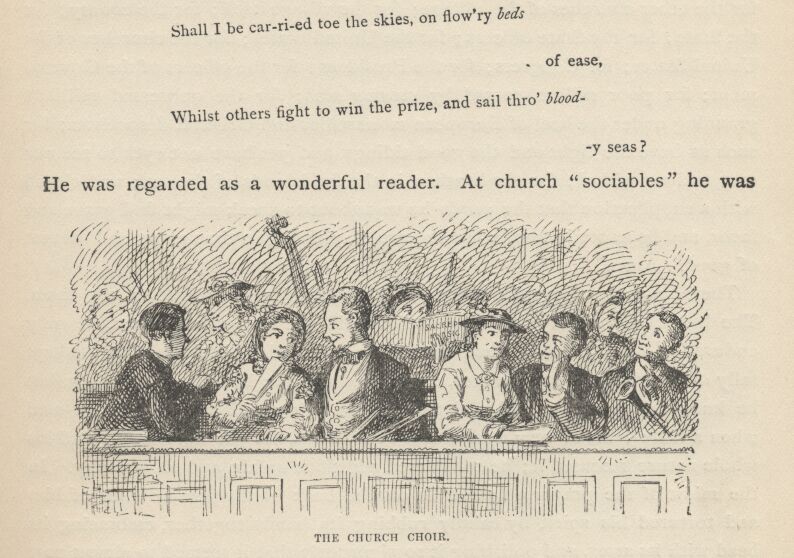
Shall I be car-ri-ed toe the skies, on flow'ry BEDS of ease,
Whilst others fight to win the prize, and sail thro' BLOOD-y seas?
He was regarded as a wonderful reader. At church "sociables" he was always called upon to read poetry; and when he was through, the ladies would lift up their hands and let them fall helplessly in their laps, and "wall" their eyes, and shake their heads, as much as to say, "Words cannot express it; it is too beautiful, TOO beautiful for this mortal earth."
After the hymn had been sung, the Rev. Mr. Sprague turned himself into a bulletin-board, and read off "notices" of meetings and societies and things till it seemed that the list would stretch out to the crack of doom—a queer custom which is still kept up in America, even in cities, away here in this age of abundant newspapers. Often, the less there is to justify a traditional custom, the harder it is to get rid of it.
And now the minister prayed. A good, generous prayer it was, and went into details: it pleaded for the church, and the little children of the church; for the other churches of the village; for the village itself; for the county; for the State; for the State officers; for the United States; for the churches of the United States; for Congress; for the President; for the officers of the Government; for poor sailors, tossed by stormy seas; for the oppressed millions groaning under the heel of European monarchies and Oriental despotisms; for such as have the light and the good tidings, and yet have not eyes to see nor ears to hear withal; for the heathen in the far islands of the sea; and closed with a supplication that the words he was about to speak might find grace and favor, and be as seed sown in fertile ground, yielding in time a grateful harvest of good. Amen.
There was a rustling of dresses, and the standing congregation sat down. The boy whose history this book relates did not enjoy the prayer, he only endured it—if he even did that much. He was restive all through it; he kept tally of the details of the prayer, unconsciously—for he was not listening, but he knew the ground of old, and the clergyman's regular route over it—and when a little trifle of new matter was interlarded, his ear detected it and his whole nature resented it; he considered additions unfair, and scoundrelly. In the midst of the prayer a fly had lit on the back of the pew in front of him and tortured his spirit by calmly rubbing its hands together, embracing its head with its arms, and polishing it so vigorously that it seemed to almost part company with the body, and the slender thread of a neck was exposed to view; scraping its wings with its hind legs and smoothing them to its body as if they had been coat-tails; going through its whole toilet as tranquilly as if it knew it was perfectly safe. As indeed it was; for as sorely as Tom's hands itched to grab for it they did not dare—he believed his soul would be instantly destroyed if he did such a thing while the prayer was going on. But with the closing sentence his hand began to curve and steal forward; and the instant the "Amen" was out the fly was a prisoner of war. His aunt detected the act and made him let it go.
The minister gave out his text and droned along monotonously through an argument that was so prosy that many a head by and by began to nod—and yet it was an argument that dealt in limitless fire and brimstone and thinned the predestined elect down to a company so small as to be hardly worth the saving. Tom counted the pages of the sermon; after church he always knew how many pages there had been, but he seldom knew anything else about the discourse. However, this time he was really interested for a little while. The minister made a grand and moving picture of the assembling together of the world's hosts at the millennium when the lion and the lamb should lie down together and a little child should lead them. But the pathos, the lesson, the moral of the great spectacle were lost upon the boy; he only thought of the conspicuousness of the principal character before the on-looking nations; his face lit with the thought, and he said to himself that he wished he could be that child, if it was a tame lion.
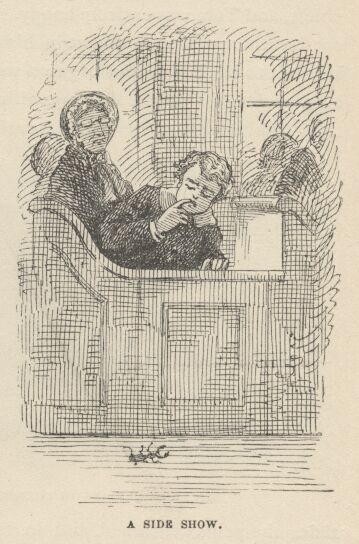
Now he lapsed into suffering again, as the dry argument was resumed. Presently he bethought him of a treasure he had and got it out. It was a large black beetle with formidable jaws—a "pinchbug," he called it. It was in a percussion-cap box. The first thing the beetle did was to take him by the finger. A natural fillip followed, the beetle went floundering into the aisle and lit on its back, and the hurt finger went into the boy's mouth. The beetle lay there working its helpless legs, unable to turn over. Tom eyed it, and longed for it; but it was safe out of his reach. Other people uninterested in the sermon found relief in the beetle, and they eyed it too. Presently a vagrant poodle dog came idling along, sad at heart, lazy with the summer softness and the quiet, weary of captivity, sighing for change. He spied the beetle; the drooping tail lifted and wagged. He surveyed the prize; walked around it; smelt at it from a safe distance; walked around it again; grew bolder, and took a closer smell; then lifted his lip and made a gingerly snatch at it, just missing it; made another, and another; began to enjoy the diversion; subsided to his stomach with the beetle between his paws, and continued his experiments; grew weary at last, and then indifferent and absent-minded. His head nodded, and little by little his chin descended and touched the enemy, who seized it. There was a sharp yelp, a flirt of the poodle's head, and the beetle fell a couple of yards away, and lit on its back once more. The neighboring spectators shook with a gentle inward joy, several faces went behind fans and hand-kerchiefs, and Tom was entirely happy. The dog looked foolish, and probably felt so; but there was resentment in his heart, too, and a craving for revenge. So he went to the beetle and began a wary attack on it again; jumping at it from every point of a circle, lighting with his fore-paws within an inch of the creature, making even closer snatches at it with his teeth, and jerking his head till his ears flapped again. But he grew tired once more, after a while; tried to amuse himself with a fly but found no relief; followed an ant around, with his nose close to the floor, and quickly wearied of that; yawned, sighed, forgot the beetle entirely, and sat down on it. Then there was a wild yelp of agony and the poodle went sailing up the aisle; the yelps continued, and so did the dog; he crossed the house in front of the altar; he flew down the other aisle; he crossed before the doors; he clamored up the home-stretch; his anguish grew with his progress, till presently he was but a woolly comet moving in its orbit with the gleam and the speed of light. At last the frantic sufferer sheered from its course, and sprang into its master's lap; he flung it out of the window, and the voice of distress quickly thinned away and died in the distance.
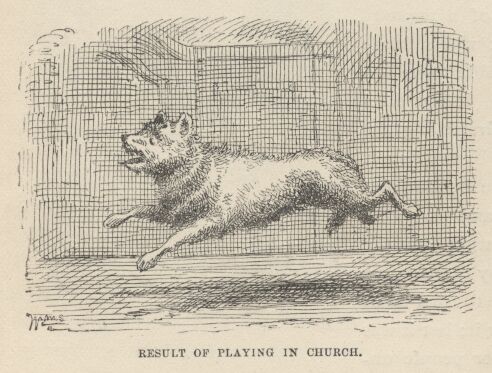
By this time the whole church was red-faced and suffocating with suppressed laughter, and the sermon had come to a dead standstill. The discourse was resumed presently, but it went lame and halting, all possibility of impressiveness being at an end; for even the gravest sentiments were constantly being received with a smothered burst of unholy mirth, under cover of some remote pew-back, as if the poor parson had said a rarely facetious thing. It was a genuine relief to the whole congregation when the ordeal was over and the benediction pronounced.
Tom Sawyer went home quite cheerful, thinking to himself that there was some satisfaction about divine service when there was a bit of variety in it. He had but one marring thought; he was willing that the dog should play with his pinchbug, but he did not think it was upright in him to carry it off.
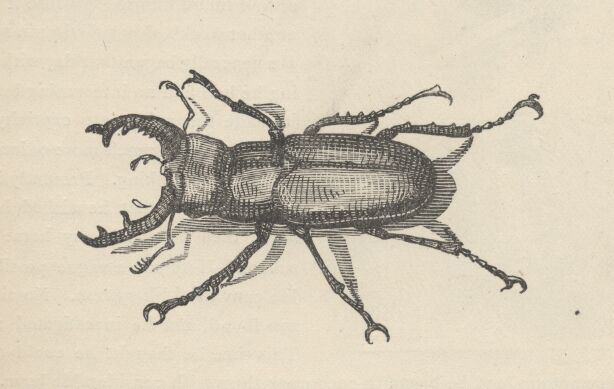
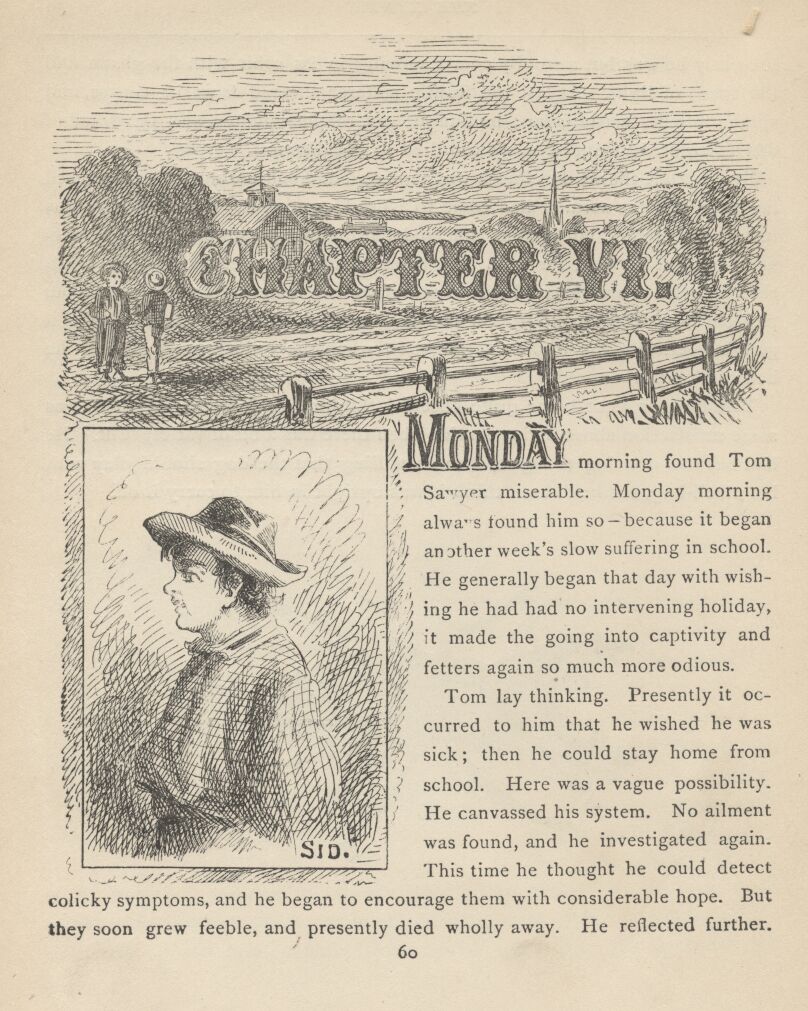
MONDAY morning found Tom Sawyer miserable. Monday morning always found him so—because it began another week's slow suffering in school. He generally began that day with wishing he had had no intervening holiday, it made the going into captivity and fetters again so much more odious.
Tom lay thinking. Presently it occurred to him that he wished he was sick; then he could stay home from school. Here was a vague possibility. He canvassed his system. No ailment was found, and he investigated again. This time he thought he could detect colicky symptoms, and he began to encourage them with considerable hope. But they soon grew feeble, and presently died wholly away. He reflected further. Suddenly he discovered something. One of his upper front teeth was loose. This was lucky; he was about to begin to groan, as a "starter," as he called it, when it occurred to him that if he came into court with that argument, his aunt would pull it out, and that would hurt. So he thought he would hold the tooth in reserve for the present, and seek further. Nothing offered for some little time, and then he remembered hearing the doctor tell about a certain thing that laid up a patient for two or three weeks and threatened to make him lose a finger. So the boy eagerly drew his sore toe from under the sheet and held it up for inspection. But now he did not know the necessary symptoms. However, it seemed well worth while to chance it, so he fell to groaning with considerable spirit.
But Sid slept on unconscious.
Tom groaned louder, and fancied that he began to feel pain in the toe.
No result from Sid.
Tom was panting with his exertions by this time. He took a rest and then swelled himself up and fetched a succession of admirable groans.
Sid snored on.
Tom was aggravated. He said, "Sid, Sid!" and shook him. This course worked well, and Tom began to groan again. Sid yawned, stretched, then brought himself up on his elbow with a snort, and began to stare at Tom. Tom went on groaning. Sid said:
"Tom! Say, Tom!" [No response.] "Here, Tom! TOM! What is the matter, Tom?" And he shook him and looked in his face anxiously.
Tom moaned out:
"Oh, don't, Sid. Don't joggle me."
"Why, what's the matter, Tom? I must call auntie."
"No—never mind. It'll be over by and by, maybe. Don't call anybody."
"But I must! DON'T groan so, Tom, it's awful. How long you been this way?"
"Hours. Ouch! Oh, don't stir so, Sid, you'll kill me."
"Tom, why didn't you wake me sooner? Oh, Tom, DON'T! It makes my flesh crawl to hear you. Tom, what is the matter?"
"I forgive you everything, Sid. [Groan.] Everything you've ever done to me. When I'm gone—"
"Oh, Tom, you ain't dying, are you? Don't, Tom—oh, don't. Maybe—"
"I forgive everybody, Sid. [Groan.] Tell 'em so, Sid. And Sid, you give my window-sash and my cat with one eye to that new girl that's come to town, and tell her—"
But Sid had snatched his clothes and gone. Tom was suffering in reality, now, so handsomely was his imagination working, and so his groans had gathered quite a genuine tone.
Sid flew downstairs and said:
"Oh, Aunt Polly, come! Tom's dying!"
"Dying!"
"Yes'm. Don't wait—come quick!"
"Rubbage! I don't believe it!"
But she fled upstairs, nevertheless, with Sid and Mary at her heels. And her face grew white, too, and her lip trembled. When she reached the bedside she gasped out:
"You, Tom! Tom, what's the matter with you?"
"Oh, auntie, I'm—"
"What's the matter with you—what is the matter with you, child?"
"Oh, auntie, my sore toe's mortified!"
The old lady sank down into a chair and laughed a little, then cried a little, then did both together. This restored her and she said:
"Tom, what a turn you did give me. Now you shut up that nonsense and climb out of this."
The groans ceased and the pain vanished from the toe. The boy felt a little foolish, and he said:
"Aunt Polly, it SEEMED mortified, and it hurt so I never minded my tooth at all."
"Your tooth, indeed! What's the matter with your tooth?"
"One of them's loose, and it aches perfectly awful."
"There, there, now, don't begin that groaning again. Open your mouth. Well—your tooth IS loose, but you're not going to die about that. Mary, get me a silk thread, and a chunk of fire out of the kitchen."
Tom said:
"Oh, please, auntie, don't pull it out. It don't hurt any more. I wish I may never stir if it does. Please don't, auntie. I don't want to stay home from school."

"Oh, you don't, don't you? So all this row was because you thought you'd get to stay home from school and go a-fishing? Tom, Tom, I love you so, and you seem to try every way you can to break my old heart with your outrageousness." By this time the dental instruments were ready. The old lady made one end of the silk thread fast to Tom's tooth with a loop and tied the other to the bedpost. Then she seized the chunk of fire and suddenly thrust it almost into the boy's face. The tooth hung dangling by the bedpost, now.
But all trials bring their compensations. As Tom wended to school after breakfast, he was the envy of every boy he met because the gap in his upper row of teeth enabled him to expectorate in a new and admirable way. He gathered quite a following of lads interested in the exhibition; and one that had cut his finger and had been a centre of fascination and homage up to this time, now found himself suddenly without an adherent, and shorn of his glory. His heart was heavy, and he said with a disdain which he did not feel that it wasn't anything to spit like Tom Sawyer; but another boy said, "Sour grapes!" and he wandered away a dismantled hero.
Shortly Tom came upon the juvenile pariah of the village, Huckleberry Finn, son of the town drunkard. Huckleberry was cordially hated and dreaded by all the mothers of the town, because he was idle and lawless and vulgar and bad—and because all their children admired him so, and delighted in his forbidden society, and wished they dared to be like him. Tom was like the rest of the respectable boys, in that he envied Huckleberry his gaudy outcast condition, and was under strict orders not to play with him. So he played with him every time he got a chance. Huckleberry was always dressed in the cast-off clothes of full-grown men, and they were in perennial bloom and fluttering with rags. His hat was a vast ruin with a wide crescent lopped out of its brim; his coat, when he wore one, hung nearly to his heels and had the rearward buttons far down the back; but one suspender supported his trousers; the seat of the trousers bagged low and contained nothing, the fringed legs dragged in the dirt when not rolled up.
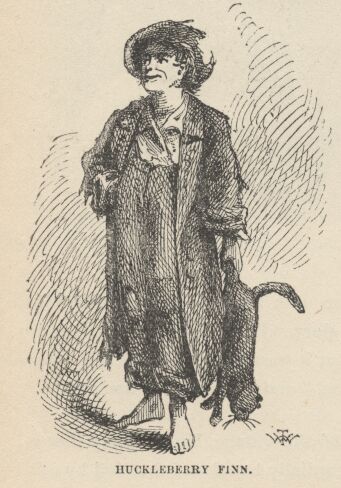
Huckleberry came and went, at his own free will. He slept on doorsteps in fine weather and in empty hogsheads in wet; he did not have to go to school or to church, or call any being master or obey anybody; he could go fishing or swimming when and where he chose, and stay as long as it suited him; nobody forbade him to fight; he could sit up as late as he pleased; he was always the first boy that went barefoot in the spring and the last to resume leather in the fall; he never had to wash, nor put on clean clothes; he could swear wonderfully. In a word, everything that goes to make life precious that boy had. So thought every harassed, hampered, respectable boy in St. Petersburg.
Tom hailed the romantic outcast:
"Hello, Huckleberry!"
"Hello yourself, and see how you like it."
"What's that you got?"
"Dead cat."
"Lemme see him, Huck. My, he's pretty stiff. Where'd you get him ?"
"Bought him off'n a boy."
"What did you give?"
"I give a blue ticket and a bladder that I got at the slaughter-house."
"Where'd you get the blue ticket?"
"Bought it off'n Ben Rogers two weeks ago for a hoop-stick."
"Say—what is dead cats good for, Huck?"
"Good for? Cure warts with."
"No! Is that so? I know something that's better."
"I bet you don't. What is it?"
"Why, spunk-water."
"Spunk-water! I wouldn't give a dern for spunk-water."
"You wouldn't, wouldn't you? D'you ever try it?"
"No, I hain't. But Bob Tanner did."
"Who told you so!"
"Why, he told Jeff Thatcher, and Jeff told Johnny Baker, and Johnny told Jim Hollis, and Jim told Ben Rogers, and Ben told a nigger, and the nigger told me. There now!"
"Well, what of it? They'll all lie. Leastways all but the nigger. I don't know HIM. But I never see a nigger that WOULDN'T lie. Shucks! Now you tell me how Bob Tanner done it, Huck."
"Why, he took and dipped his hand in a rotten stump where the rain-water was."
"In the daytime?"
"Certainly."
"With his face to the stump?"
"Yes. Least I reckon so."
"Did he say anything?"
"I don't reckon he did. I don't know."
"Aha! Talk about trying to cure warts with spunk-water such a blame fool way as that! Why, that ain't a-going to do any good. You got to go all by yourself, to the middle of the woods, where you know there's a spunk- water stump, and just as it's midnight you back up against the stump and jam your hand in and say:
'Barley-corn, barley-corn, injun-meal shorts, Spunk-water, spunk-water, swaller these warts,'
and then walk away quick, eleven steps, with your eyes shut, and then turn around three times and walk home without speaking to anybody. Because if you speak the charm's busted."
"Well, that sounds like a good way; but that ain't the way Bob Tanner done."
"No, sir, you can bet he didn't, becuz he's the wartiest boy in this town; and he wouldn't have a wart on him if he'd knowed how to work spunk-water. I've took off thousands of warts off of my hands that way, Huck. I play with frogs so much that I've always got considerable many warts. Sometimes I take 'em off with a bean."
"Yes, bean's good. I've done that."
"Have you? What's your way?"
"You take and split the bean, and cut the wart so as to get some blood, and then you put the blood on one piece of the bean and take and dig a hole and bury it 'bout midnight at the crossroads in the dark of the moon, and then you burn up the rest of the bean. You see that piece that's got the blood on it will keep drawing and drawing, trying to fetch the other piece to it, and so that helps the blood to draw the wart, and pretty soon off she comes."
"Yes, that's it, Huck—that's it; though when you're burying it if you say 'Down bean; off wart; come no more to bother me!' it's better. That's the way Joe Harper does, and he's been nearly to Coonville and most everywheres. But say—how do you cure 'em with dead cats?"
"Why, you take your cat and go and get in the grave-yard 'long about midnight when somebody that was wicked has been buried; and when it's midnight a devil will come, or maybe two or three, but you can't see 'em, you can only hear something like the wind, or maybe hear 'em talk; and when they're taking that feller away, you heave your cat after 'em and say, 'Devil follow corpse, cat follow devil, warts follow cat, I'm done with ye!' That'll fetch ANY wart."
"Sounds right. D'you ever try it, Huck?"
"No, but old Mother Hopkins told me."
"Well, I reckon it's so, then. Becuz they say she's a witch."
"Say! Why, Tom, I KNOW she is. She witched pap. Pap says so his own self. He come along one day, and he see she was a-witching him, so he took up a rock, and if she hadn't dodged, he'd a got her. Well, that very night he rolled off'n a shed wher' he was a layin drunk, and broke his arm."
"Why, that's awful. How did he know she was a-witching him?"
"Lord, pap can tell, easy. Pap says when they keep looking at you right stiddy, they're a-witching you. Specially if they mumble. Becuz when they mumble they're saying the Lord's Prayer backards."

"Say, Hucky, when you going to try the cat?"
"To-night. I reckon they'll come after old Hoss Williams to-night."
"But they buried him Saturday. Didn't they get him Saturday night?"
"Why, how you talk! How could their charms work till midnight?—and THEN it's Sunday. Devils don't slosh around much of a Sunday, I don't reckon."
"I never thought of that. That's so. Lemme go with you?"
"Of course—if you ain't afeard."
"Afeard! 'Tain't likely. Will you meow?"
"Yes—and you meow back, if you get a chance. Last time, you kep' me a-meowing around till old Hays went to throwing rocks at me and says 'Dern that cat!' and so I hove a brick through his window—but don't you tell."
"I won't. I couldn't meow that night, becuz auntie was watching me, but I'll meow this time. Say—what's that?"
"Nothing but a tick."
"Where'd you get him?"
"Out in the woods."
"What'll you take for him?"
"I don't know. I don't want to sell him."
"All right. It's a mighty small tick, anyway."
"Oh, anybody can run a tick down that don't belong to them. I'm satisfied with it. It's a good enough tick for me."
"Sho, there's ticks a plenty. I could have a thousand of 'em if I wanted to."
"Well, why don't you? Becuz you know mighty well you can't. This is a pretty early tick, I reckon. It's the first one I've seen this year."
"Say, Huck—I'll give you my tooth for him."
"Less see it."
Tom got out a bit of paper and carefully unrolled it. Huckleberry viewed it wistfully. The temptation was very strong. At last he said:
"Is it genuwyne?"
Tom lifted his lip and showed the vacancy.
"Well, all right," said Huckleberry, "it's a trade."
Tom enclosed the tick in the percussion-cap box that had lately been the pinchbug's prison, and the boys separated, each feeling wealthier than before.
When Tom reached the little isolated frame school-house, he strode in briskly, with the manner of one who had come with all honest speed. He hung his hat on a peg and flung himself into his seat with business-like alacrity. The master, throned on high in his great splint-bottom arm-chair, was dozing, lulled by the drowsy hum of study. The interruption roused him.
"Thomas Sawyer!"
Tom knew that when his name was pronounced in full, it meant trouble.
"Sir!"
"Come up here. Now, sir, why are you late again, as usual?"
Tom was about to take refuge in a lie, when he saw two long tails of yellow hair hanging down a back that he recognized by the electric sympathy of love; and by that form was THE ONLY VACANT PLACE on the girls' side of the school-house. He instantly said:
"I STOPPED TO TALK WITH HUCKLEBERRY FINN!"
The master's pulse stood still, and he stared helplessly. The buzz of study ceased. The pupils wondered if this foolhardy boy had lost his mind. The master said:
"You—you did what?"
"Stopped to talk with Huckleberry Finn."
There was no mistaking the words.
"Thomas Sawyer, this is the most astounding confession I have ever listened to. No mere ferule will answer for this offence. Take off your jacket."

The master's arm performed until it was tired and the stock of switches notably diminished. Then the order followed:
"Now, sir, go and sit with the girls! And let this be a warning to you."
The titter that rippled around the room appeared to abash the boy, but in reality that result was caused rather more by his worshipful awe of his unknown idol and the dread pleasure that lay in his high good fortune. He sat down upon the end of the pine bench and the girl hitched herself away from him with a toss of her head. Nudges and winks and whispers traversed the room, but Tom sat still, with his arms upon the long, low desk before him, and seemed to study his book.
By and by attention ceased from him, and the accustomed school murmur rose upon the dull air once more. Presently the boy began to steal furtive glances at the girl. She observed it, "made a mouth" at him and gave him the back of her head for the space of a minute. When she cautiously faced around again, a peach lay before her. She thrust it away. Tom gently put it back. She thrust it away again, but with less animosity. Tom patiently returned it to its place. Then she let it remain. Tom scrawled on his slate, "Please take it—I got more." The girl glanced at the words, but made no sign. Now the boy began to draw something on the slate, hiding his work with his left hand. For a time the girl refused to notice; but her human curiosity presently began to manifest itself by hardly perceptible signs. The boy worked on, apparently unconscious. The girl made a sort of non-committal attempt to see, but the boy did not betray that he was aware of it. At last she gave in and hesitatingly whispered:
"Let me see it."
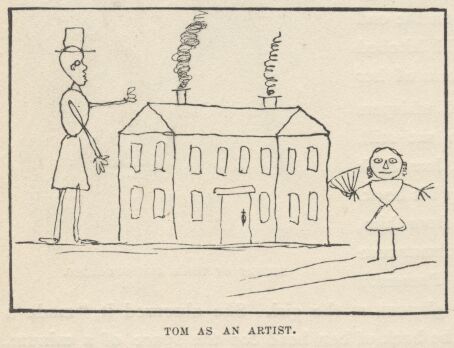
Tom partly uncovered a dismal caricature of a house with two gable ends to it and a corkscrew of smoke issuing from the chimney. Then the girl's interest began to fasten itself upon the work and she forgot everything else. When it was finished, she gazed a moment, then whispered:
"It's nice—make a man."
The artist erected a man in the front yard, that resembled a derrick. He could have stepped over the house; but the girl was not hypercritical; she was satisfied with the monster, and whispered:
"It's a beautiful man—now make me coming along."
Tom drew an hour-glass with a full moon and straw limbs to it and armed the spreading fingers with a portentous fan. The girl said:
"It's ever so nice—I wish I could draw."
"It's easy," whispered Tom, "I'll learn you."
"Oh, will you? When?"
"At noon. Do you go home to dinner?"
"I'll stay if you will."
"Good—that's a whack. What's your name?"
"Becky Thatcher. What's yours? Oh, I know. It's Thomas Sawyer."
"That's the name they lick me by. I'm Tom when I'm good. You call me Tom, will you?"
"Yes."
Now Tom began to scrawl something on the slate, hiding the words from the girl. But she was not backward this time. She begged to see. Tom said:
"Oh, it ain't anything."
"Yes it is."
"No it ain't. You don't want to see."
"Yes I do, indeed I do. Please let me."
"You'll tell."
"No I won't—deed and deed and double deed won't."
"You won't tell anybody at all? Ever, as long as you live?"
"No, I won't ever tell ANYbody. Now let me."
"Oh, YOU don't want to see!"
"Now that you treat me so, I WILL see." And she put her small hand upon his and a little scuffle ensued, Tom pretending to resist in earnest but letting his hand slip by degrees till these words were revealed: "I LOVE YOU."
"Oh, you bad thing!" And she hit his hand a smart rap, but reddened and looked pleased, nevertheless.
Just at this juncture the boy felt a slow, fateful grip closing on his ear, and a steady lifting impulse. In that vise he was borne across the house and deposited in his own seat, under a peppering fire of giggles from the whole school. Then the master stood over him during a few awful moments, and finally moved away to his throne without saying a word. But although Tom's ear tingled, his heart was jubilant.
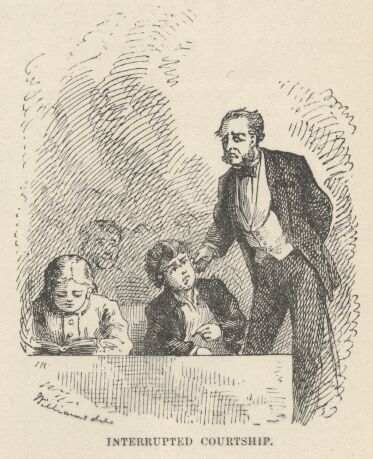
As the school quieted down Tom made an honest effort to study, but the turmoil within him was too great. In turn he took his place in the reading class and made a botch of it; then in the geography class and turned lakes into mountains, mountains into rivers, and rivers into continents, till chaos was come again; then in the spelling class, and got "turned down," by a succession of mere baby words, till he brought up at the foot and yielded up the pewter medal which he had worn with ostentation for months.
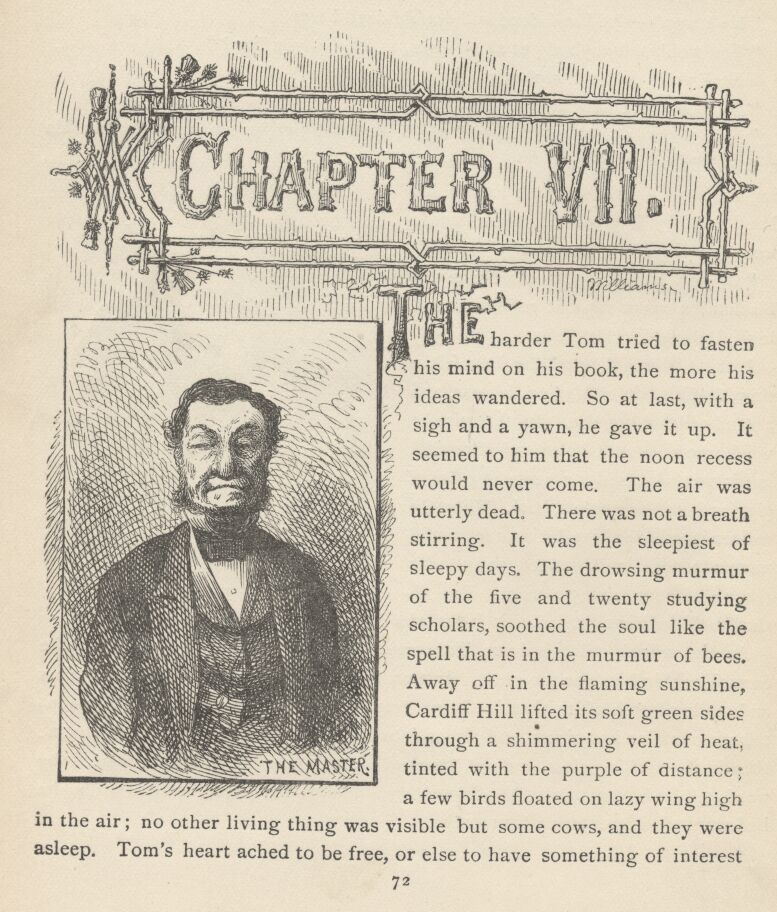
THE harder Tom tried to fasten his mind on his book, the more his ideas wandered. So at last, with a sigh and a yawn, he gave it up. It seemed to him that the noon recess would never come. The air was utterly dead. There was not a breath stirring. It was the sleepiest of sleepy days. The drowsing murmur of the five and twenty studying scholars soothed the soul like the spell that is in the murmur of bees. Away off in the flaming sunshine, Cardiff Hill lifted its soft green sides through a shimmering veil of heat, tinted with the purple of distance; a few birds floated on lazy wing high in the air; no other living thing was visible but some cows, and they were asleep. Tom's heart ached to be free, or else to have something of interest to do to pass the dreary time. His hand wandered into his pocket and his face lit up with a glow of gratitude that was prayer, though he did not know it. Then furtively the percussion-cap box came out. He released the tick and put him on the long flat desk. The creature probably glowed with a gratitude that amounted to prayer, too, at this moment, but it was premature: for when he started thankfully to travel off, Tom turned him aside with a pin and made him take a new direction.
Tom's bosom friend sat next him, suffering just as Tom had been, and now he was deeply and gratefully interested in this entertainment in an instant. This bosom friend was Joe Harper. The two boys were sworn friends all the week, and embattled enemies on Saturdays. Joe took a pin out of his lapel and began to assist in exercising the prisoner. The sport grew in interest momently. Soon Tom said that they were interfering with each other, and neither getting the fullest benefit of the tick. So he put Joe's slate on the desk and drew a line down the middle of it from top to bottom.
"Now," said he, "as long as he is on your side you can stir him up and I'll let him alone; but if you let him get away and get on my side, you're to leave him alone as long as I can keep him from crossing over."
"All right, go ahead; start him up."
The tick escaped from Tom, presently, and crossed the equator. Joe harassed him awhile, and then he got away and crossed back again. This change of base occurred often. While one boy was worrying the tick with absorbing interest, the other would look on with interest as strong, the two heads bowed together over the slate, and the two souls dead to all things else. At last luck seemed to settle and abide with Joe. The tick tried this, that, and the other course, and got as excited and as anxious as the boys themselves, but time and again just as he would have victory in his very grasp, so to speak, and Tom's fingers would be twitching to begin, Joe's pin would deftly head him off, and keep possession. At last Tom could stand it no longer. The temptation was too strong. So he reached out and lent a hand with his pin. Joe was angry in a moment. Said he:
"Tom, you let him alone."
"I only just want to stir him up a little, Joe."
"No, sir, it ain't fair; you just let him alone."
"Blame it, I ain't going to stir him much."
"Let him alone, I tell you."
"I won't!"
"You shall—he's on my side of the line."
"Look here, Joe Harper, whose is that tick?"
"I don't care whose tick he is—he's on my side of the line, and you sha'n't touch him."
"Well, I'll just bet I will, though. He's my tick and I'll do what I blame please with him, or die!"
A tremendous whack came down on Tom's shoulders, and its duplicate on Joe's; and for the space of two minutes the dust continued to fly from the two jackets and the whole school to enjoy it. The boys had been too absorbed to notice the hush that had stolen upon the school awhile before when the master came tiptoeing down the room and stood over them. He had contemplated a good part of the performance before he contributed his bit of variety to it.
When school broke up at noon, Tom flew to Becky Thatcher, and whispered in her ear:
"Put on your bonnet and let on you're going home; and when you get to the corner, give the rest of 'em the slip, and turn down through the lane and come back. I'll go the other way and come it over 'em the same way."
So the one went off with one group of scholars, and the other with another. In a little while the two met at the bottom of the lane, and when they reached the school they had it all to themselves. Then they sat together, with a slate before them, and Tom gave Becky the pencil and held her hand in his, guiding it, and so created another surprising house. When the interest in art began to wane, the two fell to talking. Tom was swimming in bliss. He said:
"Do you love rats?"
"No! I hate them!"
"Well, I do, too—LIVE ones. But I mean dead ones, to swing round your head with a string."
"No, I don't care for rats much, anyway. What I like is chewing-gum."
"Oh, I should say so! I wish I had some now."
"Do you? I've got some. I'll let you chew it awhile, but you must give it back to me."
That was agreeable, so they chewed it turn about, and dangled their legs against the bench in excess of contentment.
"Was you ever at a circus?" said Tom.
"Yes, and my pa's going to take me again some time, if I'm good."
"I been to the circus three or four times—lots of times. Church ain't shucks to a circus. There's things going on at a circus all the time. I'm going to be a clown in a circus when I grow up."
"Oh, are you! That will be nice. They're so lovely, all spotted up."
"Yes, that's so. And they get slathers of money—most a dollar a day, Ben Rogers says. Say, Becky, was you ever engaged?"
"What's that?"
"Why, engaged to be married."
"No."
"Would you like to?"
"I reckon so. I don't know. What is it like?"
"Like? Why it ain't like anything. You only just tell a boy you won't ever have anybody but him, ever ever ever, and then you kiss and that's all. Anybody can do it."
"Kiss? What do you kiss for?"
"Why, that, you know, is to—well, they always do that."
"Everybody?"
"Why, yes, everybody that's in love with each other. Do you remember what I wrote on the slate?"
"Ye—yes."
"What was it?"
"I sha'n't tell you."
"Shall I tell YOU?"
"Ye—yes—but some other time."
"No, now."
"No, not now—to-morrow."
"Oh, no, NOW. Please, Becky—I'll whisper it, I'll whisper it ever so easy."
Becky hesitating, Tom took silence for consent, and passed his arm about her waist and whispered the tale ever so softly, with his mouth close to her ear. And then he added:
"Now you whisper it to me—just the same."
She resisted, for a while, and then said:
"You turn your face away so you can't see, and then I will. But you mustn't ever tell anybody—WILL you, Tom? Now you won't, WILL you?"
"No, indeed, indeed I won't. Now, Becky."
He turned his face away. She bent timidly around till her breath stirred his curls and whispered, "I—love—you!"
Then she sprang away and ran around and around the desks and benches, with Tom after her, and took refuge in a corner at last, with her little white apron to her face. Tom clasped her about her neck and pleaded:
"Now, Becky, it's all done—all over but the kiss. Don't you be afraid of that—it ain't anything at all. Please, Becky." And he tugged at her apron and the hands.
By and by she gave up, and let her hands drop; her face, all glowing with the struggle, came up and submitted. Tom kissed the red lips and said:
"Now it's all done, Becky. And always after this, you know, you ain't ever to love anybody but me, and you ain't ever to marry anybody but me, ever never and forever. Will you?"
"No, I'll never love anybody but you, Tom, and I'll never marry anybody but you—and you ain't to ever marry anybody but me, either."
"Certainly. Of course. That's PART of it. And always coming to school or when we're going home, you're to walk with me, when there ain't anybody looking—and you choose me and I choose you at parties, because that's the way you do when you're engaged."
"It's so nice. I never heard of it before."
"Oh, it's ever so gay! Why, me and Amy Lawrence—"
The big eyes told Tom his blunder and he stopped, confused.
"Oh, Tom! Then I ain't the first you've ever been engaged to!"
The child began to cry. Tom said:
"Oh, don't cry, Becky, I don't care for her any more."
"Yes, you do, Tom—you know you do."
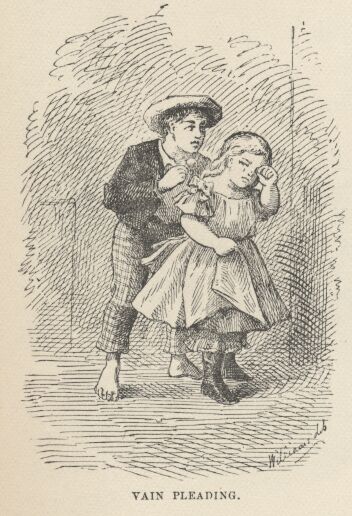
Tom tried to put his arm about her neck, but she pushed him away and turned her face to the wall, and went on crying. Tom tried again, with soothing words in his mouth, and was repulsed again. Then his pride was up, and he strode away and went outside. He stood about, restless and uneasy, for a while, glancing at the door, every now and then, hoping she would repent and come to find him. But she did not. Then he began to feel badly and fear that he was in the wrong. It was a hard struggle with him to make new advances, now, but he nerved himself to it and entered. She was still standing back there in the corner, sobbing, with her face to the wall. Tom's heart smote him. He went to her and stood a moment, not knowing exactly how to proceed. Then he said hesitatingly:
"Becky, I—I don't care for anybody but you."
No reply—but sobs.
"Becky"—pleadingly. "Becky, won't you say something?"
More sobs.
Tom got out his chiefest jewel, a brass knob from the top of an andiron, and passed it around her so that she could see it, and said:
"Please, Becky, won't you take it?"
She struck it to the floor. Then Tom marched out of the house and over the hills and far away, to return to school no more that day. Presently Becky began to suspect. She ran to the door; he was not in sight; she flew around to the play-yard; he was not there. Then she called:
"Tom! Come back, Tom!"
She listened intently, but there was no answer. She had no companions but silence and loneliness. So she sat down to cry again and upbraid herself; and by this time the scholars began to gather again, and she had to hide her griefs and still her broken heart and take up the cross of a long, dreary, aching afternoon, with none among the strangers about her to exchange sorrows with.
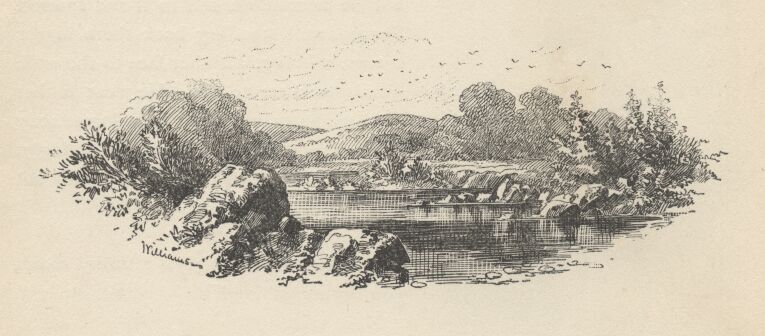
End of the Project Gutenberg EBook of The Adventures of Tom Sawyer, Part 2.
by Mark Twain (Samuel Clemens)
*** END OF THIS PROJECT GUTENBERG EBOOK TOM SAWYER, PART 2. ***
***** This file should be named 7194-h.htm or 7194-h.zip *****
This and all associated files of various formats will be found in:
http://www.gutenberg.net/7/1/9/7194/
Produced by David Widger
Updated editions will replace the previous one--the old editions
will be renamed.
Creating the works from public domain print editions means that no
one owns a United States copyright in these works, so the Foundation
(and you!) can copy and distribute it in the United States without
permission and without paying copyright royalties. Special rules,
set forth in the General Terms of Use part of this license, apply to
copying and distributing Project Gutenberg-tm electronic works to
protect the PROJECT GUTENBERG-tm concept and trademark. Project
Gutenberg is a registered trademark, and may not be used if you
charge for the eBooks, unless you receive specific permission. If you
do not charge anything for copies of this eBook, complying with the
rules is very easy. You may use this eBook for nearly any purpose
such as creation of derivative works, reports, performances and
research. They may be modified and printed and given away--you may do
practically ANYTHING with public domain eBooks. Redistribution is
subject to the trademark license, especially commercial
redistribution.
*** START: FULL LICENSE ***
THE FULL PROJECT GUTENBERG LICENSE
PLEASE READ THIS BEFORE YOU DISTRIBUTE OR USE THIS WORK
To protect the Project Gutenberg-tm mission of promoting the free
distribution of electronic works, by using or distributing this work
(or any other work associated in any way with the phrase "Project
Gutenberg"), you agree to comply with all the terms of the Full Project
Gutenberg-tm License (available with this file or online at
http://gutenberg.net/license).
Section 1. General Terms of Use and Redistributing Project Gutenberg-tm
electronic works
1.A. By reading or using any part of this Project Gutenberg-tm
electronic work, you indicate that you have read, understand, agree to
and accept all the terms of this license and intellectual property
(trademark/copyright) agreement. If you do not agree to abide by all
the terms of this agreement, you must cease using and return or destroy
all copies of Project Gutenberg-tm electronic works in your possession.
If you paid a fee for obtaining a copy of or access to a Project
Gutenberg-tm electronic work and you do not agree to be bound by the
terms of this agreement, you may obtain a refund from the person or
entity to whom you paid the fee as set forth in paragraph 1.E.8.
1.B. "Project Gutenberg" is a registered trademark. It may only be
used on or associated in any way with an electronic work by people who
agree to be bound by the terms of this agreement. There are a few
things that you can do with most Project Gutenberg-tm electronic works
even without complying with the full terms of this agreement. See
paragraph 1.C below. There are a lot of things you can do with Project
Gutenberg-tm electronic works if you follow the terms of this agreement
and help preserve free future access to Project Gutenberg-tm electronic
works. See paragraph 1.E below.
1.C. The Project Gutenberg Literary Archive Foundation ("the Foundation"
or PGLAF), owns a compilation copyright in the collection of Project
Gutenberg-tm electronic works. Nearly all the individual works in the
collection are in the public domain in the United States. If an
individual work is in the public domain in the United States and you are
located in the United States, we do not claim a right to prevent you from
copying, distributing, performing, displaying or creating derivative
works based on the work as long as all references to Project Gutenberg
are removed. Of course, we hope that you will support the Project
Gutenberg-tm mission of promoting free access to electronic works by
freely sharing Project Gutenberg-tm works in compliance with the terms of
this agreement for keeping the Project Gutenberg-tm name associated with
the work. You can easily comply with the terms of this agreement by
keeping this work in the same format with its attached full Project
Gutenberg-tm License when you share it without charge with others.
1.D. The copyright laws of the place where you are located also govern
what you can do with this work. Copyright laws in most countries are in
a constant state of change. If you are outside the United States, check
the laws of your country in addition to the terms of this agreement
before downloading, copying, displaying, performing, distributing or
creating derivative works based on this work or any other Project
Gutenberg-tm work. The Foundation makes no representations concerning
the copyright status of any work in any country outside the United
States.
1.E. Unless you have removed all references to Project Gutenberg:
1.E.1. The following sentence, with active links to, or other immediate
access to, the full Project Gutenberg-tm License must appear prominently
whenever any copy of a Project Gutenberg-tm work (any work on which the
phrase "Project Gutenberg" appears, or with which the phrase "Project
Gutenberg" is associated) is accessed, displayed, performed, viewed,
copied or distributed:
This eBook is for the use of anyone anywhere at no cost and with
almost no restrictions whatsoever. You may copy it, give it away or
re-use it under the terms of the Project Gutenberg License included
with this eBook or online at www.gutenberg.net
1.E.2. If an individual Project Gutenberg-tm electronic work is derived
from the public domain (does not contain a notice indicating that it is
posted with permission of the copyright holder), the work can be copied
and distributed to anyone in the United States without paying any fees
or charges. If you are redistributing or providing access to a work
with the phrase "Project Gutenberg" associated with or appearing on the
work, you must comply either with the requirements of paragraphs 1.E.1
through 1.E.7 or obtain permission for the use of the work and the
Project Gutenberg-tm trademark as set forth in paragraphs 1.E.8 or
1.E.9.
1.E.3. If an individual Project Gutenberg-tm electronic work is posted
with the permission of the copyright holder, your use and distribution
must comply with both paragraphs 1.E.1 through 1.E.7 and any additional
terms imposed by the copyright holder. Additional terms will be linked
to the Project Gutenberg-tm License for all works posted with the
permission of the copyright holder found at the beginning of this work.
1.E.4. Do not unlink or detach or remove the full Project Gutenberg-tm
License terms from this work, or any files containing a part of this
work or any other work associated with Project Gutenberg-tm.
1.E.5. Do not copy, display, perform, distribute or redistribute this
electronic work, or any part of this electronic work, without
prominently displaying the sentence set forth in paragraph 1.E.1 with
active links or immediate access to the full terms of the Project
Gutenberg-tm License.
1.E.6. You may convert to and distribute this work in any binary,
compressed, marked up, nonproprietary or proprietary form, including any
word processing or hypertext form. However, if you provide access to or
distribute copies of a Project Gutenberg-tm work in a format other than
"Plain Vanilla ASCII" or other format used in the official version
posted on the official Project Gutenberg-tm web site (www.gutenberg.net),
you must, at no additional cost, fee or expense to the user, provide a
copy, a means of exporting a copy, or a means of obtaining a copy upon
request, of the work in its original "Plain Vanilla ASCII" or other
form. Any alternate format must include the full Project Gutenberg-tm
License as specified in paragraph 1.E.1.
1.E.7. Do not charge a fee for access to, viewing, displaying,
performing, copying or distributing any Project Gutenberg-tm works
unless you comply with paragraph 1.E.8 or 1.E.9.
1.E.8. You may charge a reasonable fee for copies of or providing
access to or distributing Project Gutenberg-tm electronic works provided
that
- You pay a royalty fee of 20% of the gross profits you derive from
the use of Project Gutenberg-tm works calculated using the method
you already use to calculate your applicable taxes. The fee is
owed to the owner of the Project Gutenberg-tm trademark, but he
has agreed to donate royalties under this paragraph to the
Project Gutenberg Literary Archive Foundation. Royalty payments
must be paid within 60 days following each date on which you
prepare (or are legally required to prepare) your periodic tax
returns. Royalty payments should be clearly marked as such and
sent to the Project Gutenberg Literary Archive Foundation at the
address specified in Section 4, "Information about donations to
the Project Gutenberg Literary Archive Foundation."
- You provide a full refund of any money paid by a user who notifies
you in writing (or by e-mail) within 30 days of receipt that s/he
does not agree to the terms of the full Project Gutenberg-tm
License. You must require such a user to return or
destroy all copies of the works possessed in a physical medium
and discontinue all use of and all access to other copies of
Project Gutenberg-tm works.
- You provide, in accordance with paragraph 1.F.3, a full refund of any
money paid for a work or a replacement copy, if a defect in the
electronic work is discovered and reported to you within 90 days
of receipt of the work.
- You comply with all other terms of this agreement for free
distribution of Project Gutenberg-tm works.
1.E.9. If you wish to charge a fee or distribute a Project Gutenberg-tm
electronic work or group of works on different terms than are set
forth in this agreement, you must obtain permission in writing from
both the Project Gutenberg Literary Archive Foundation and Michael
Hart, the owner of the Project Gutenberg-tm trademark. Contact the
Foundation as set forth in Section 3 below.
1.F.
1.F.1. Project Gutenberg volunteers and employees expend considerable
effort to identify, do copyright research on, transcribe and proofread
public domain works in creating the Project Gutenberg-tm
collection. Despite these efforts, Project Gutenberg-tm electronic
works, and the medium on which they may be stored, may contain
"Defects," such as, but not limited to, incomplete, inaccurate or
corrupt data, transcription errors, a copyright or other intellectual
property infringement, a defective or damaged disk or other medium, a
computer virus, or computer codes that damage or cannot be read by
your equipment.
1.F.2. LIMITED WARRANTY, DISCLAIMER OF DAMAGES - Except for the "Right
of Replacement or Refund" described in paragraph 1.F.3, the Project
Gutenberg Literary Archive Foundation, the owner of the Project
Gutenberg-tm trademark, and any other party distributing a Project
Gutenberg-tm electronic work under this agreement, disclaim all
liability to you for damages, costs and expenses, including legal
fees. YOU AGREE THAT YOU HAVE NO REMEDIES FOR NEGLIGENCE, STRICT
LIABILITY, BREACH OF WARRANTY OR BREACH OF CONTRACT EXCEPT THOSE
PROVIDED IN PARAGRAPH F3. YOU AGREE THAT THE FOUNDATION, THE
TRADEMARK OWNER, AND ANY DISTRIBUTOR UNDER THIS AGREEMENT WILL NOT BE
LIABLE TO YOU FOR ACTUAL, DIRECT, INDIRECT, CONSEQUENTIAL, PUNITIVE OR
INCIDENTAL DAMAGES EVEN IF YOU GIVE NOTICE OF THE POSSIBILITY OF SUCH
DAMAGE.
1.F.3. LIMITED RIGHT OF REPLACEMENT OR REFUND - If you discover a
defect in this electronic work within 90 days of receiving it, you can
receive a refund of the money (if any) you paid for it by sending a
written explanation to the person you received the work from. If you
received the work on a physical medium, you must return the medium with
your written explanation. The person or entity that provided you with
the defective work may elect to provide a replacement copy in lieu of a
refund. If you received the work electronically, the person or entity
providing it to you may choose to give you a second opportunity to
receive the work electronically in lieu of a refund. If the second copy
is also defective, you may demand a refund in writing without further
opportunities to fix the problem.
1.F.4. Except for the limited right of replacement or refund set forth
in paragraph 1.F.3, this work is provided to you 'AS-IS' WITH NO OTHER
WARRANTIES OF ANY KIND, EXPRESS OR IMPLIED, INCLUDING BUT NOT LIMITED TO
WARRANTIES OF MERCHANTIBILITY OR FITNESS FOR ANY PURPOSE.
1.F.5. Some states do not allow disclaimers of certain implied
warranties or the exclusion or limitation of certain types of damages.
If any disclaimer or limitation set forth in this agreement violates the
law of the state applicable to this agreement, the agreement shall be
interpreted to make the maximum disclaimer or limitation permitted by
the applicable state law. The invalidity or unenforceability of any
provision of this agreement shall not void the remaining provisions.
1.F.6. INDEMNITY - You agree to indemnify and hold the Foundation, the
trademark owner, any agent or employee of the Foundation, anyone
providing copies of Project Gutenberg-tm electronic works in accordance
with this agreement, and any volunteers associated with the production,
promotion and distribution of Project Gutenberg-tm electronic works,
harmless from all liability, costs and expenses, including legal fees,
that arise directly or indirectly from any of the following which you do
or cause to occur: (a) distribution of this or any Project Gutenberg-tm
work, (b) alteration, modification, or additions or deletions to any
Project Gutenberg-tm work, and (c) any Defect you cause.
Section 2. Information about the Mission of Project Gutenberg-tm
Project Gutenberg-tm is synonymous with the free distribution of
electronic works in formats readable by the widest variety of computers
including obsolete, old, middle-aged and new computers. It exists
because of the efforts of hundreds of volunteers and donations from
people in all walks of life.
Volunteers and financial support to provide volunteers with the
assistance they need, is critical to reaching Project Gutenberg-tm's
goals and ensuring that the Project Gutenberg-tm collection will
remain freely available for generations to come. In 2001, the Project
Gutenberg Literary Archive Foundation was created to provide a secure
and permanent future for Project Gutenberg-tm and future generations.
To learn more about the Project Gutenberg Literary Archive Foundation
and how your efforts and donations can help, see Sections 3 and 4
and the Foundation web page at http://www.pglaf.org.
Section 3. Information about the Project Gutenberg Literary Archive
Foundation
The Project Gutenberg Literary Archive Foundation is a non profit
501(c)(3) educational corporation organized under the laws of the
state of Mississippi and granted tax exempt status by the Internal
Revenue Service. The Foundation's EIN or federal tax identification
number is 64-6221541. Its 501(c)(3) letter is posted at
http://pglaf.org/fundraising. Contributions to the Project Gutenberg
Literary Archive Foundation are tax deductible to the full extent
permitted by U.S. federal laws and your state's laws.
The Foundation's principal office is located at 4557 Melan Dr. S.
Fairbanks, AK, 99712., but its volunteers and employees are scattered
throughout numerous locations. Its business office is located at
809 North 1500 West, Salt Lake City, UT 84116, (801) 596-1887, email
business@pglaf.org. Email contact links and up to date contact
information can be found at the Foundation's web site and official
page at http://pglaf.org
For additional contact information:
Dr. Gregory B. Newby
Chief Executive and Director
gbnewby@pglaf.org
Section 4. Information about Donations to the Project Gutenberg
Literary Archive Foundation
Project Gutenberg-tm depends upon and cannot survive without wide
spread public support and donations to carry out its mission of
increasing the number of public domain and licensed works that can be
freely distributed in machine readable form accessible by the widest
array of equipment including outdated equipment. Many small donations
($1 to $5,000) are particularly important to maintaining tax exempt
status with the IRS.
The Foundation is committed to complying with the laws regulating
charities and charitable donations in all 50 states of the United
States. Compliance requirements are not uniform and it takes a
considerable effort, much paperwork and many fees to meet and keep up
with these requirements. We do not solicit donations in locations
where we have not received written confirmation of compliance. To
SEND DONATIONS or determine the status of compliance for any
particular state visit http://pglaf.org
While we cannot and do not solicit contributions from states where we
have not met the solicitation requirements, we know of no prohibition
against accepting unsolicited donations from donors in such states who
approach us with offers to donate.
International donations are gratefully accepted, but we cannot make
any statements concerning tax treatment of donations received from
outside the United States. U.S. laws alone swamp our small staff.
Please check the Project Gutenberg Web pages for current donation
methods and addresses. Donations are accepted in a number of other
ways including including checks, online payments and credit card
donations. To donate, please visit: http://pglaf.org/donate
Section 5. General Information About Project Gutenberg-tm electronic
works.
Professor Michael S. Hart is the originator of the Project Gutenberg-tm
concept of a library of electronic works that could be freely shared
with anyone. For thirty years, he produced and distributed Project
Gutenberg-tm eBooks with only a loose network of volunteer support.
Project Gutenberg-tm eBooks are often created from several printed
editions, all of which are confirmed as Public Domain in the U.S.
unless a copyright notice is included. Thus, we do not necessarily
keep eBooks in compliance with any particular paper edition.
Most people start at our Web site which has the main PG search facility:
http://www.gutenberg.net
This Web site includes information about Project Gutenberg-tm,
including how to make donations to the Project Gutenberg Literary
Archive Foundation, how to help produce our new eBooks, and how to
subscribe to our email newsletter to hear about new eBooks.